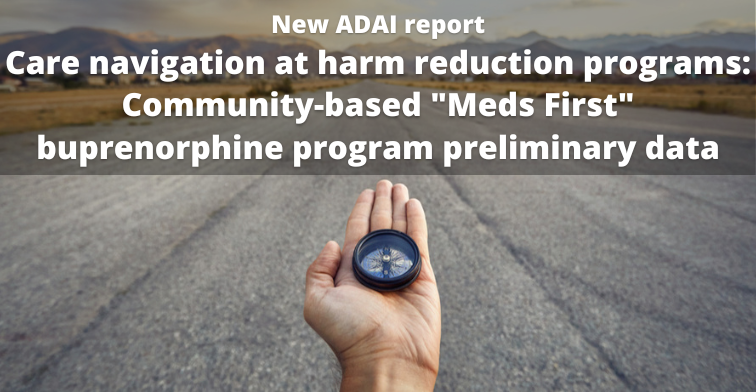Care Navigation at Harm Reduction Programs: Community-Based “Meds First” Buprenorphine Program Preliminary Data
06/22/2022
ADAI Report by Susan Kingston & Caleb Banta-Green
In 2019, the Addictions, Drug & Alcohol Institute (ADAI) at the University of Washington launched the “Meds First” program to provide onsite, low-barrier access to buprenorphine in partnership with six syringe services programs across WA State.
A key component of the Meds First service model was the addition of care navigation to support client engagement and retention in OUD treatment.
This ADAI report:
- Describes the role of care navigators in buprenorphine treatment at syringe services programs/harm reduction programs.
- Provides preliminary data on the type, length, and content of care navigation activities.
Discusses lessons learned and the potential opportunities and challenges to expand this service model.
Key Findings
- Care navigation fits flexibly and productively within community-based harm reduction programs.
- Participants of harm reduction programs want—and use—care navigation services, especially in-person support.
- Providing opioid use disorder treatment with a harm reduction orientation supports honest conversations about drug use.
Care navigation services could be an important feature of a broader, low-barrier, “one-stop” model of health care available at harm reduction programs for people who use drugs and are not adequately served by traditional health care settings.
Related resources
Learn more about WA State Syringe Services Programs
- Surveys and interviews with WA State Syringe Services Program Participants
- Directory of WA State Syringe Services Programs
Citation: Kingston S, Banta-Green C.J. Care Navigation at Harm Reduction Programs: Community-Based “Meds First” Buprenorphine Program Preliminary Data. Seattle, WA: Addictions, Drug & Alcohol Institute, Department of Psychiatry & Behavioral Sciences, School of Medicine, University of Washington, June 2022.





